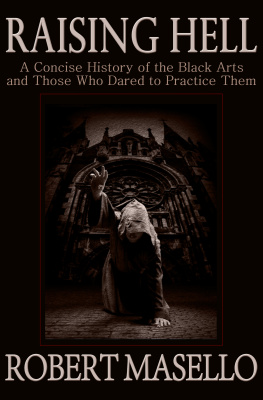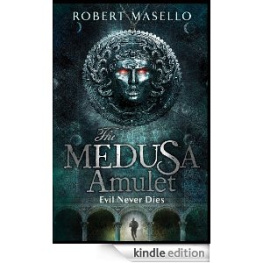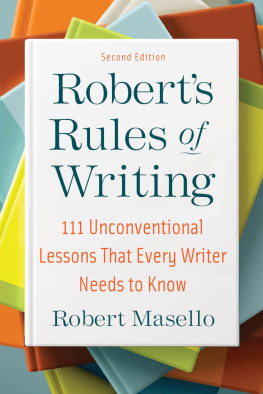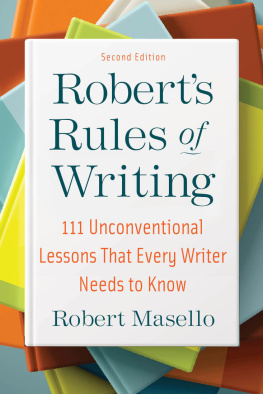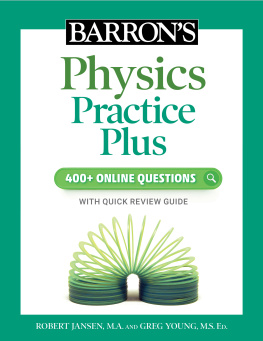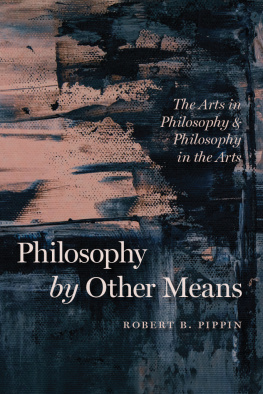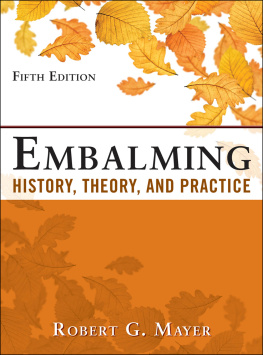Robert Masello - Raising Hell: A Concise History of the black Arts and Those Who Dared to Practice Them
Here you can read online Robert Masello - Raising Hell: A Concise History of the black Arts and Those Who Dared to Practice Them full text of the book (entire story) in english for free. Download pdf and epub, get meaning, cover and reviews about this ebook. year: 1996, publisher: Open Road Media, genre: Religion. Description of the work, (preface) as well as reviews are available. Best literature library LitArk.com created for fans of good reading and offers a wide selection of genres:
Romance novel
Science fiction
Adventure
Detective
Science
History
Home and family
Prose
Art
Politics
Computer
Non-fiction
Religion
Business
Children
Humor
Choose a favorite category and find really read worthwhile books. Enjoy immersion in the world of imagination, feel the emotions of the characters or learn something new for yourself, make an fascinating discovery.
- Book:Raising Hell: A Concise History of the black Arts and Those Who Dared to Practice Them
- Author:
- Publisher:Open Road Media
- Genre:
- Year:1996
- Rating:4 / 5
- Favourites:Add to favourites
- Your mark:
- 80
- 1
- 2
- 3
- 4
- 5
Raising Hell: A Concise History of the black Arts and Those Who Dared to Practice Them: summary, description and annotation
We offer to read an annotation, description, summary or preface (depends on what the author of the book "Raising Hell: A Concise History of the black Arts and Those Who Dared to Practice Them" wrote himself). If you haven't found the necessary information about the book — write in the comments, we will try to find it.
Raising Hell: A Concise History of the black Arts and Those Who Dared to Practice Them — read online for free the complete book (whole text) full work
Below is the text of the book, divided by pages. System saving the place of the last page read, allows you to conveniently read the book "Raising Hell: A Concise History of the black Arts and Those Who Dared to Practice Them" online for free, without having to search again every time where you left off. Put a bookmark, and you can go to the page where you finished reading at any time.
Font size:
Interval:
Bookmark:


All rights reserved, including without limitation the right to reproduce this ebook or any portion thereof in any form or by any means, whether electronic or mechanical, now known or hereinafter invented, without the express written permission of the publisher.
Copyright 1996 by Robert Masello
ISBN: 978-1-4976-3806-8
This edition published in 2014 by Open Road Integrated Media, Inc.
180 Maiden Lane
New York, NY 10038
www.openroadmedia.com

| FAUST: | Did not my conjuring raise thee? Speak. |
| MEPHOSTOPHILIS: | That was the case, but yet per accidens : For when we hear one rack the name of God, Abjure the Scriptures and his savior Christ, We fly in hope to get his glorious soul. Nor will we come unless he use such means Whereby he is in danger to be damnd. Therefore the shortest cut for conjuring Is stoutly to abjure all godliness And pray devoutly to the Prince of Hell. |
Christopher Marlowe, The Tragical History of the Life and Death of Doctor Faustus (c. 1594) |
C ONTENTS
:
:
:
:
:
P REFACE
When anyone invokes the Devil
with intentional ceremonies,
the Devil comes, and is seen.
Eliphas Lvi,
French occultist
(c. 181075)
Who in full possession of his faculties would ever deliberately invoke the Devil?
Who would call up infernal powers and then hope, once the demons were conjured, to be able to control them?
If the history of black magic and the occult reveals anything at all, it reveals that the drive to marshal the unseen powers of the dark and bend them to a mortal will is as old as mankind itself. Men and women have believed, in virtually every age and in every land, that there is another worldthis one invisible, eternal, and essentially unknowablecoexistent with the one we inhabit every day. It is the world of spirits and souls, angels and demons, gods and monsters, and in it can be found the answers to all the great questions: What is life all about? Does man decide his own fate? Is death truly an end? Is there a Heaven? And is there, perhaps more important, a Hell?
Magic, the mystical precursor of religion, professed to have the answers. But where white magic looked for these answers from a divine, or holy, source, black magic looked in the other direction; by enlisting the aid of Satan or his spawn, sorcerers and magicians claimed to be able to probe the great mysteries. They made pacts with demons, promising their immortal souls in exchange for a lifetime of riches or a godlike glimpse of the cosmic order. They raised the souls of the dead, to ask them where theyd gone and how theyd gotten there. They pored over ancient and sacred texts, the Holy Scriptures, the Cabbala, the Egyptian Book of the Dead, searching through the cryptic words for clues and advice.
Along the way, these occult pioneers often stumbled upon real and verifiable truths: the astrologers mapped the heavens and paved the way for the astronomers who followed; the alchemists, in their futile quest to make gold from lead, performed thousands of experiments which led to the discovery of everything from phosphorus, sodium sulfate, and benzoic acid to the manufacturing of steel. Even the seers, who read palms and interpreted dreams, contributed to the vast catalog of human thought and deed, and anticipated in their own way such later practices as psychology and hypnosis.
What made their efforts all the more surprisingin some cases, dare it be said, even inspiringwere the dangers, both real and imagined, that these explorers of the dark side faced. First, there was the ever-present threat of ecclesiastical or royal condemnation. Dabbling in the occult could get you interrogated, excommunicated, tortured, mangled, hanged, burned at the stake. (Or, as in the case of Father Grandier, who was accused of bewitching the nuns of Loudun, all of the above.)
Then, there was the imagined danger implicit in the act of conjurationif you summoned a demon straight from Hell, there was a very good chance hed try to take you back home with him. In all the grimoires (grammars) of black magic, there were repeated warnings and explicit instructions about what to watch out for. Demons were wily sorts, the books declared, who werent too happy about taking orders from any witch or magician; given the slightest opportunity, theyd do their best to kill the conjurers mortal body and make off with his immortal soul. When at long last it came time for Faust to make good on his deal with the devil, for instance, his body was found torn to pieces in an open field, and his soulwell, that was assumed, according to most accounts, to have been carried off to perdition.
Even so, the occult arts have never disappeared and have frequently flourished. Though many of them had their origins in the ancient nations of the Middle East (where they formed the very basis of the faiths of Babylon and Egypt), during the Middle Ages and Renaissance they reached their zenith in western Europe. There, the antique practices were revived, revered, and refined; there, they were combined with the latest discoveries in medicine, metallurgy, astronomy, anatomy, botany, and zoology and subjected to the spirit of inquiry that increasingly distinguished the era. What started as magic occasionally became fact. Occult arts over time turned into rudimentary science.
And though the Devil and his minions were gradually ushered from the scene, they were never altogether banished. They were always waiting in the wings listening patiently for their cue to return ready to offer, to anyone foolhardy enough to accept it, their unholy bargain.
BLACK MAGIC
AND
SORCERY
I hereby promise the Great Spirit Lucifuge, Prince of Demons, that each year I will bring unto him a human soul to do with as it may please him, and in return Lucifuge promises to bestow upon me the treasures of the earth and fulfill my every desire for the length of my natural life. If I fail to bring him each year the offering specified above, then my own soul shall be forfeit to him.
Signed_____________________[Invocant signs pact with his own blood.]
The Complete Book of Magic Science,
unpublished manuscript in the British Museum
THE MAGUS
In the West, he has gone by many names. Magus, sorcerer, wizard, magician. We know him best as a figure in a long robe, bespangled with stars, wearing a pointed hat and a long white beard, wielding a magic wand. He is the master of the occult world and its invisible forces, able to call up storms, cast spells, defy nature, and make all things do his bidding.
But the true origins of the magus lie in the East, in the ancient empire of Persia.
There, the magi, or wise men, were the high priests, the interpreters of the wisdom of Zoroaster. Our word magic is derived from their name. They were revered for their profound learning and for their gift of prophecy; rulers consulted them on everything from matters of personal health to great affairs of state. In their own temples, built on the highest mountaintops, the magi made the search for truth their chief aim; to that end, they studied the sky and the stars and made sacrifices to the elements. Because they believed in the transmigration of souls, they generally abstained from eating any kind of meat.
Font size:
Interval:
Bookmark:
Similar books «Raising Hell: A Concise History of the black Arts and Those Who Dared to Practice Them»
Look at similar books to Raising Hell: A Concise History of the black Arts and Those Who Dared to Practice Them. We have selected literature similar in name and meaning in the hope of providing readers with more options to find new, interesting, not yet read works.
Discussion, reviews of the book Raising Hell: A Concise History of the black Arts and Those Who Dared to Practice Them and just readers' own opinions. Leave your comments, write what you think about the work, its meaning or the main characters. Specify what exactly you liked and what you didn't like, and why you think so.

